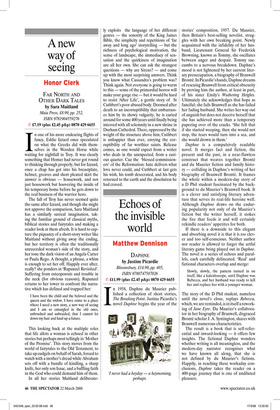A new way of seeing
Honor Clerk
FAR NORTH AND OTHER DARK TALES by Sara Maitland Maia Press, £8.99, pp. 252, ISBN 9781904559276 ✆ £7.19 (plus £2.45 p&p) 0870 429 6655 In one of his more endearing flights of fancy, Eddie Izzard once speculated on what the Greeks did with themselves in the Wooden Horse while waiting for nightfall in Troy. It was clearly something that Homer had never got round to thinking through properly, but for Izzard, once a chap has got into his breastplate, helmet, greaves and short pleated skirt the answer is obvious — housework, and not just housework but hoovering the inside of his temporary home before he gets down to the real business of the warrior hero.
The fall of Troy has never seemed quite the same after Izzard, and though she might not approve the comparison, Sara Maitland has a similarly surreal imagination, taking the familiar ground of classical myths, biblical stories and fairytales and making a reader look at them afresh. It is hard to capture the piquancy of a short-story writer like Maitland without giving away the ending, but her territory is often the traditionally unrecorded woman’s side of the story, and her tone the dark vision of an Angela Carter or Paula Rego. A thought, a phrase, a whim is enough to set her off. Happily ever after, really? she ponders in ‘Rapunzel Revisited’. Suffering from osteoporosis and trouble in the neck (for obvious reasons), Rapunzel returns to her tower to confront the narrative which has defined and trapped her:
I have been the child and the beloved and the queen and the widow. I have come to a place where I need a new story, a new way of seeing and I am so entangled in the old ones, unbrushed and unbraided, that I cannot let down my hair and haul up a future.
This looking back at the multiple roles that life allots a woman is echoed in other stories but perhaps most tellingly in ‘Mother of the Promise’. This story moves from the world of fairytales to the Old Testament, to take up cudgels on behalf of Sarah, forced to watch with a mother’s dread while Abraham sets off with a bundle of kindling, a sharp knife, her only son Isaac, and a baffling faith in the God who could demand him of them.
In all her stories Maitland deliberate ly exploits the language of her different genres — the sonority of the King James Bible, the simplicity and repetitions of ‘far away and long ago’ storytelling — but the richness of psychological motivation, the sense of landscape, the immediacy of sensation and the quirkiness of imagination are all her own. She can ask the strangest questions — why are Sirens? — and come up with the most surprising answers. Think you know what Cassandra’s problem was? Think again. Not everyone is going to warm to this — some of the primordial horror will make your gorge rise — but it would be hard to resist ‘After Life’, a gentle story of St Cuthbert’s poor abused body. Doomed after death to an incorruptibility that embarrasses him by its showy vulgarity, he is carted around for some 400 years until finally being interred with all solemnity in a new shrine in Durham Cathedral. There, oppressed by the weight of the structure above him, Cuthbert is unhappier than ever, envying the corruptibility of far worthier saints. Release comes, as one would expect from a writer who deals in the unexpected, from a curious quarter. Cue the ‘blessed commissioners’ of the Reformation: hate delivers what love never could, and Cuthbert at last gets his wish, his tomb desecrated, and his body returned to the earth and the dissolution he had craved.


















































































 Previous page
Previous page